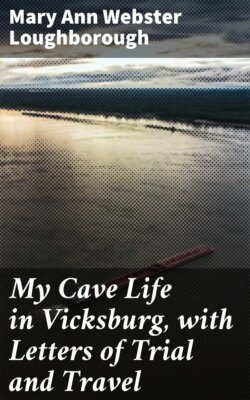Читать книгу My Cave Life in Vicksburg, with Letters of Trial and Travel - Mary Ann Webster Loughborough - Страница 5
На сайте Литреса книга снята с продажи.
CHAPTER II.
ОглавлениеTable of Contents
AT NIGHT THE SIGNAL GUN SOUNDS—THE GUNBOATS ARE COMING DOWN—THE TOWN AWAKE—SHELL MUSIC—THE BOATS NEAR US—RAPID DESCENT TO THE CAVE—THEY HAVE PASSED SAFELY—WHY THE CONFEDERATE GUNS DO NOT FIRE—THE BURNING TRANSPORT.
At night I was sleeping profoundly, when the deep boom of the signal cannon startled and awoke me. Another followed, and I sprang from my bed, drew on my slippers and robe, and went out on the veranda. Our friends were already there. The river was illuminated by large fires on the bank, and we could discern plainly the huge, black masses floating down with the current, now and then belching forth fire from their sides, followed by the loud report, and we could hear the shells exploding in the upper part of town. The night was one of pitchy darkness; and as they neared the glare thrown upon the river from the large fires, the gunboats could be plainly seen. Each one, on passing the track of the brilliant light on the water, became a target for the land batteries. We could hear the gallop, in the darkness, of couriers upon the paved streets; we could hear the voices of the soldiers on the riverside. The rapid firing from the boats, the roar of the Confederate batteries, and, above all, the screaming, booming sound of the shells, as they exploded in the air and around the city, made at once a new and fearful scene to me. The boats were rapidly nearing the lower batteries, and the shells were beginning to fly unpleasantly near. My heart beat quickly as the flashes of light from the portholes seemed facing us. Some of the gentlemen urged the ladies to go down into the cave at the back of the house, and insisted on my going, if alone. While I hesitated, fearing to remain, yet wishing still to witness the termination of the engagement, a shell exploded near the side of the house. Fear instantly decided me, and I ran, guided by one of the ladies, who pointed down the steep slope of the hill, and left me to run back for a shawl. While I was considering the best way of descending the hill, another shell exploded near the foot, and, ceasing to hesitate, I flew down, half sliding and running. Before I had reached the mouth of the cave, two more exploded on the side of the hill near me. Breathless and terrified, I found the entrance and ran in, having left one of my slippers on the hillside.
I found two or three of our friends had already sought refuge under the earth; and we had not been there long before we were joined by the remainder of the party, who reported the boats opposite the house. As I had again become perfectly calm and collected, I was sorry to find myself slightly fluttered and in a state of rapid heart-beatings, as shell after shell fell in the valley below us, exploding with a loud, rumbling noise, perfectly deafening. The cave was an excavation in the earth the size of a large room, high enough for the tallest person to stand perfectly erect, provided with comfortable seats, and altogether quite a large and habitable abode (compared with some of the caves in the city), were it not for the dampness and the constant contact with the soft earthy walls. We had remained but a short time, when one of the gentlemen came down to tell us that all danger was over, and that we might witness a beautiful sight by going upon the hill, as one of the transports had been fired by a shell, and was slowly floating down as it burned.
We returned to the house, and from the veranda looked on the burning boat, the only one, so far as we could ascertain, that had been injured, the other boats having all passed successfully by the city. We remained on the veranda an hour or more, the gentlemen speculating on the result of the successful run by the batteries. All were astonished and chagrined. It was found that very few of the Confederate guns had been discharged at all. Several reasons had been assigned; the real one was supposed to have been the quality of the fuses that were recently sent from Richmond, and had not been tried since their arrival. This night of all others they were found to be defective. The lurid glare from the burning boat fell in red and amber light upon the house, the veranda, and the animated faces turned toward the river—lighting the white magnolias, paling the pink crape myrtles, and bringing out in bright distinctness the railing of the terrace, where drooped in fragrant wreaths the clustering passion vine: fair and beautiful, but false, the crimson, wavering light.
I sat and gazed upon the burning wreck of what an hour ago had thronged with human life; with men whose mothers had this very night prayed for them; with men whose wives tearfully hovered over little beds, kissing each tender, sleeping lid for the absent one. Had this night made them orphans? Did this smooth, deceitful current of the glowing waters glide over forms loved and lost to the faithful ones at home? O mother and wife! ye will pray and smile on, until the terrible tidings come: “Lost at Vicksburg!” Lost at Vicksburg! In how many a heart the name for years will lie like a brand!—lie until the warm heart and tried soul shall be at peace forever.
